October 19, 2014
Dear waste pickers and allies,
We are happy to share with you the 11th issue of “Struggles and Victories: Waste Pickers on the Frontline”. In this issue, we have news from waste pickers’ groups in Paris, where the biffins are defending their right to sell their recycled goods at street markets. In Canada, waste pickers celebrated after reaching a goal of recycling 150,000 glass and plastic bottles.
We are happy to share some success stories. After a long struggle (see past issues to learn more), the children of waste pickers in Pune, India, are finally getting their due from the state government. In August, the state government finally agreed to include waste pickers’ children as beneficiaries of a school scholarship program.
In Argentina, after almost a month of conflict, in August the waste pickers of Bahía Blanca, together with the Federation of Waste Pickers of Argentina, successfully came to an agreement with the municipal government.
As part of the collaborative video series “Chronicles of a Struggle for Inclusion” about the organized waste pickers of Colombia, a new video is out on the struggle to include waste pickers who use animal-drawn carts as a means of livelihood. Another wonderful video is out about the role of waste pickers in Nicaragua.
In Brazil, the National Movement (MNCR) has been fighting to stop the extension of the National Solid Waste Management Policy’s deadline to close all open dumps across the country. Find out why in this newsletter and also sign the petition against this action.
And there’s a lot more!
In solidarity,
Deia, Lucia, Pablo
WIEGO Communications support team for GlobalRec.org
Table of Contents
Asia
Latin America
Europe
North America
 Asia
Asia
German Ambassador takes up the Rice Bucket Challenge with Chintan (India) by CHINTAN (09/09/2014)
Chintan Environmental Research and Action Group with the German ambassador Michael Steiner, took up the ‘Rice Bucket Challenge’, donating rice to more than 300 families residing in a slum in Chanakyapuri, one of the areas Chintan is working with. “Many people are taking up the ice bucket challenge but here in India, it is not about ice but rice. The idea is that society still accepts the fact that there are poor people and we have to change that,” Steiner said. Around 392 families residing in Vivekanand Camp in Chanakyapuri queued up to receive a bucket of five kilograms of rice. The idea of the event, organised by Chintan and the German Embassy, was to raise awareness to help in eradicating poverty. Chintan partners with the informal recycling sector, such as wastepickers and kabaris, to clean up cities, recycle more efficiently and create livelihoods. As a result, it is also able to help children picking trash to go to school, as families earn steadier incomes. Read the complete press release.
A victory for waste pickers’ children in India (India) by KKPKP (09/08/2014)
Waste pickers of Maharashtra are in a celebratory mood. On August 27th, the Maharashtra Government finally conceded to their demand for inclusion under the centrally (federally) sponsored pre-matric scholarship scheme for children of those working in “unclean” occupations. It took ten years for the UPA government to comprehend that waste pickers carried out their work handling garbage and unmentionable filth. It took the Maharashtra government 16 months to issue a resolution including children of waste pickers in the state. The children missed out on the scholarship last year. Over 60,000 children across the state will now get Rs.1850 each year towards their education. The bare minimum costs for children studying in government schools came to Rs.4000 per annum excluding transport. This scholarship will contribute to the expenses in some measure. Read an article about the victory.
Waste pickers and volunteers divert 177 tons of festival offerings from rivers (India) by SWaCH Coop (09/05/2014)
The swarming river ghats of Pune continue to fill as uninterrupted resounding crowds arrive from all directions of the city to bid farewell to Lord Ganesha. The significance of immersing the idol symbolizes the Lord taking our sorrows along with Him and returning again next year to protect us. But between this symbolism and merriment lies the bleak reality of ecological degradation that comes with immersing idols and Nirmalaya (festival offerings) in our water bodies. As part of the 7 year old campaign led by SWaCH – a Pune based waste picker’s collective — every year waste pickers face an uphill battle during Ganesh Chaturthi dissuading devotees from dumping floral offerings in the rivers. Citizens in huge numbers gather around the ghats to offload a mountain of Nirmalaya, including flowers, fruit, coconuts, cloth, incense, camphor and thermocole based elaborate decorations used for housing the idols. Amidst all this chaos are the waste pickers doing their bit for the environment and planting responsibility. Despite heavy rains, lack of toilets at the ghats and without any financial support from Pune Municipal Corporation for the initiative, 125 waste pickers of KKPKP and SWaCH along with over 500 volunteers diverted 177 tonnes of Nirmalaya from 18 ghats across PMC and PCMC this Visarjan. Read the complete press release.
There is a rose in Seemapuri (India) by Recycle and Pray (08/14/2014)
Seemapuri in north east Delhi is one of many hubs where waste pickers (kabadiwala) sort, bale and ship waste resources. Since over a year ago, a start up of all women waste workers has been crafting one of a kind flowers and other gift items. The creative process is 100% reuse down to the packaging being used for export shipping! Now it is a critical time in India for waste workers and especially women waste workers. Please see this link for a vivid example of the daily toils faced by a woman picker in central Delhi. The co-op in Seemapuri is known as “Kabad Se Jugad” (waste improves). KSJ has decided to continue on the risky road of being all independent and self sustaining by the export sales of their unique flowers and mobiles! We ship anywhere in the world and a card from sender can be included! The number of women involved is directly proportional to the number of orders received and just one order for three flowers is enough for one woman’s salary for one month! See photos and find out how you can order!
Initial Response of Informal Waste Workers to Waste Management Manual Draft (India) by AIKMM (08/01/2014)
All India Kabadi Mazdoor Mahasangh (AIKMM) has received the draft of the new Solid Waste Management Manual from the Ministry of Urban Development (MoUD). We are pleased that waste management – and in particular, the important roles that informal waste workers play in municipal solid waste management – is receiving needed attention from India’s central ministries. However, we are supremely disappointed in the process by which this manual has been drafted. First, the draft available online provides no explanation of the process by which public comments may be submitted and considered for the required minimum of 60 days. Second, we were offended to not have received any invitation from the MoUD to participate in the “National Stakeholders Workshop” in July even though our members are among the most important stakeholders in the issues covered by this manual. Third, we ask that you acknowledge it was entirely inappropriate that AIKMM (and other stakeholders) was excluded entirely from this manual’s drafting process, and that rather than play an integral role we have been asked merely to submit recommended revisions to a document that is all but complete. Read the complete document.
 Latin America
Latin America
Inclusive solid waste management models should be expanded (Argentina) by Federación Argentina de Cartoneros y Recicladores (FACYR) (09/15/2014)
We would like to express our profound disappointment with the city government’s failure to fulfill the recycling agreement. This puts at risk the public policies the waste pickers have achieved that protect the environment and include the waste pickers and recyclers. We would like to remind the legislators and citizens that recycling makes up eight percent of waste. This confirms that policies are in place that continue to believe that burying waste and reproducing terrible consequences on the environment. We would also like to note the impact that the new “Green Campaigns” system has on getting 4,500 waste pickers and recyclers out of informality and precarious conditions. We are concerned about the attitude of the Ministry of the Environment and Public Space, which, instead of supporting and strengthening inclusive public policies, is trying to take away and collapse an inclusive system that has been developed with the waste pickers’ cooperatives and state workers. Access the complete press release. Read about the mobilization.
We say no to postponing the closure of open dumps in Brazil (Brazil) by MNCR (09/08/2014)
Deputy André Moura is trying to extend another eight years the deadline for municipalities across Brazil to close their open dumps. Municipalities have already had four years to conform to the national law. The 4th Conference of the Environment, which had 200,000 participants, was defined by the social inclusion of waste pickers and the closure of open dumps. The federal government provides a specific funding stream to support municipalities so that they follow the deadline of closing their open dumps and including the waste pickers that work on them. Sign the petition.
RENAREC of Ecuador is in solidarity with the waste pickers of Bogotá (Ecuador) by RENAREC (09/08/2014)
The National Network of Waste Pickers of Ecuador (RENAREC) salutes the waste pickers of Bogotá with the following words: In response to the situation expressed by our allies in Bogotá, Colombia, as they face the implementation of the model “Bogotá Humana” (Humane Bogotá), we as RENAREC announce all of our support and solidarity with the the union that promotes socially inclusive recycling and dignity for waste pickers. Made up of 33 associations of organized waste pickers, RENAREC remains at your disposal and ready to collaborate with our hands, our actions, our thoughts, and to share in the noble cause of seeking a better life for all of us.
Why we are against extending the deadline of the national waste policy (Brazil) by MNCR (09/05/2014)
Across Brazil, open dumps cause death and disease for waste pickers. To extend for another eight years the deadline to close open dumps will mean the continuation of this degrading situation, another eight years in which waste pickers will not have adequate workplaces and equipment. For these reasons, we demand that the federal government submit to the deadlines in the National Solid Waste Management Policy (PNRS) and face these problems that municipalities have not dealt with so that we can collectively advance towards the proper treatment of solid waste and guarantee social and economic inclusion, and the defense of the environment. Access the complete press release (in Portuguese).
Recyclers in Nicaragua: A Productive and Environmental Force (Nicaragua) by Erik Flakoll Alegría (09/04/2014)
Women in Informal Employment: Globalizing and Organizing (WIEGO), Universidad Centroamericana de Nicaragua (UCA) and La Red de Emprendedores Nicaragüenses del Reciclaje (Red Nica) are collaborating to create an alliance for a baseline study of the thousands of waste pickers/recyclers in Nicaragua, the majority of whom are not heard or considered and remain invisible. This alliance aims to give voice to this important segment of society, which contributes towards environmental protection. Watch video.
Substitution of Animal Traction Vehicles in Bogota (Colombia) by WIEGO/ARB (09/04/2014)
In 2003, the national transit code sought to eradicate animal traction vehicles or animal pulled carts that would have affected hundreds of thousands in Colombia. They had to demand their rights. The Constitutional Court upheld these demands and by means of verdict 355 of 2003 it demanded municipalities to substitute –not eradicate– animal traction vehicles in the understanding that for this population these were their livelihood means. Watch the video (with English subtitles).
Another waste picker dies and municipalities insist on keeping dumpsites open (Brazil) by MNCR (09/04/2014)
On September 2nd, a waste picker died in a work-related accident at the Estrutural dumpsite in Brasília. Chico Moura, 57, who worked at the Estrutural dump for 25 years, was buried and then crushed by the machines that cover the waste at the dumpsite. In 2014 alone, four people have died inside the dump. But the government of Brasília has invested nothing in the closure of its open dumps and in the inclusion of waste pickers. The accident that killed Chico Moura happened exactly one month after the deadline for the closure of open dumps across Brazil. On September 3, a commission of federal deputies voted to extend for another eight years the deadline for municipalities to close their open dumps. The national movement of waste pickers (MNCR) is vehemently against extending this deadline, which would mean a regression and a betrayal of the National Solid Waste Management Policy. Access the complete article (in Portuguese).
The Federation of Waste Pickers of Argentina mobilizes to defend inclusive recycling (Argentina) by Federación Argentina de Cartoneros y Recicladores (FACYR) (08/25/2014)
On August 27, the waste pickers marched to the Ministry of the Environment and Public Space, protesting the city’s failure to implement the recycling service agreement. We are profoundly worried that if this continues, the Ministry of the Environment and Public Space will put at risk the health of the city, will increase the waste being buried at landfills, and will put a stop to one of the most successful and socially inclusive waste management models in all of Argentina and Latin America. For more than ten years, the waste picker cooperatives have — in precarious conditions and with much dedication — collected more than ten percent of the material that would be buried in landfills. In recent years, we have made advances, improving recycling collection in the city as well as our work conditions. We have significantly reduced child labor and guaranteed some dignity for the excluded. Access the complete article (in Spanish).
Brazilian waste pickers submit inclusive recycling proposal to the government (Brazil) by MNCR (08/22/2014)
On August 22, during the opening of the National Conference on Technologies for the Inclusion of Waste Pickers, held at the University of Brasilia, the national movement of waste pickers (MNCR) officially submitted to Minister of the Environment Gilberto Carvalho the proposal for the National Program for Investment in Popular Recycling (PRONAREP). Popular recycling is recycling done by the waste pickers, in associations and cooperatives. The PRONAREP program should introduce a fund to support waste pickers’ organizations, organized on different levels. The program should provide an alternative to public bids by private companies. The fund should support the small associations on top of open dumps as well as those that are selling collectively in organized networks. To make this plan possible, several conditions must be met (…). Access the complete press release (in Portuguese).
Inclusive Recycling in Guatemala (Guatemala) by Reciclaje Inclusivo IRR (08/13/2014)
As part of the Regional Initiative for Inclusive Recycling, the Inter-American Development Bank organized a workshop in horizontal training on organizing for waste pickers working at a sanitary landfill in Amatitlán, Guatemala. Watch the video.
A victory for the waste pickers of Bahía Blanca! (Argentina) by Federación Argentina de Cartoneros y Recicladores (FACYR) (08/07/2014)
After almost a month of conflict, the waste pickers of Bahía Blanca (Argentina), together with the Federation of Waste Pickers of Argentina (FACYR/CTEP), came to an agreement in August with the municipal government. The agreement will guarantee jobs and improved work conditions and put into effect a new socially inclusive recycling service. The conflict began when it was announced that a new ordinance would prohibit the entrance of horse-drawn carts into the municipality – without offering viable alternatives. Now, the collection will be done with manual pushcarts provided by the municipality. The material would be taken to a warehouse located 200 meters from the “exclusion zone” where the workers would be able to collectively or individually sell their material. The municipality has agreed to not expand the “exclusion zone” past the downtown area. The waste pickers will be responsible for environmental outreach and recycling collection. The municipality will be responsible for developing a system for eradicating child labor. It should provide us with tools for hygiene and security at the workplace. FACYR/CTEP are also working towards waste pickers receiving medical and other benefits. Access the press release (in Spanish).
In São Paulo, women waste pickers host a conference to strengthen leadership (Brazil) by MNCR (08/04/2014)
About 225 women waste pickers connected to the Brazilian Waste Pickers’ Movement (MNCR) participated in August in the first statewide conference for women waste pickers. The event was held in the city of Ourinhos, São Paulo. The workshops discussed public policies for women waste pickers, “women’s work” and “men’s work”, Afro-Brazilian women waste pickers, women’s sexualty, youth and drugs, and violence against women. One of the final outcomes of the workshops was acknowledging the need to discuss inequality between men and women in waste pickers cooperatives and associations, the need to develop pedagogical materials about the National Waste Policy (PNRS) in simpler language and direct contact with public fiscal officers responsible for making sure the law is implemented at the municipal level. At the conference, participants also elected a statewide commission of 13 women waste pickers. Access the complete article (in Portuguese).
 Europe
Europe
Long live the biffins of Paris! (France) by Asso Amelior (09/09/2014)
School is starting but the biffins (waste pickers) of Asso Amelior have had no vacation. After a year and a half of monthly fairs at Croix de Chavaux, about 200 biffins will again display on top of cloths or on the ground the objects they find in trash bins and in the streets. With the goal of responding to economic and social necessities, and to a public made up of shoppers and occasional visitors, the event is an opportunity to participate in solidarity against exclusion. What exclusion? The kind that the biffins face throughout the year, getting expelled from their workplaces. Asso Amelior is only able to participate in artistic local displays. Between 2 and 3 pm there will be music and dance at the Cuban School of Dance, where we will learn the rhythms and moves of Cuban dances, followed by the music of Guyom Touseul.
North America
Canadian waste pickers recycled 150,000 containers! (Canada) by Coop Les Valoristes (08/27/2014)
We thought of celebrating after recycling 120,000 containers but then we surpassed that last week! The success of the temporary recycling shed belonging to the Valoristes’ cooperative in Quebec confirms the need for permanent recycling sheds like the ones that exist across most of Canada. It also shows how little the informal recyclers (valoristes) are valued. The valoristes significantly contribute to the recycling of containers and reducing the need for landfills. Thanks to the meticulous sorting and recycling done by the valoristes, the recycling materials that are collected are of good quality. The cooperative’s efficient and environmentally-beneficial work is a bonus to its important social function. Open until September 26, 2014, the sorting shed is open from 9 am to 3 pm, Monday through Monday, and accepts every type of marked plastic, glass or aluminum container. Several institutions and businesses have brought in their containers and donated the value of the material to the Valoristes’ Solidarity Cooperative. To find out more, check out our facebook page.
Tweet


 Asia
Asia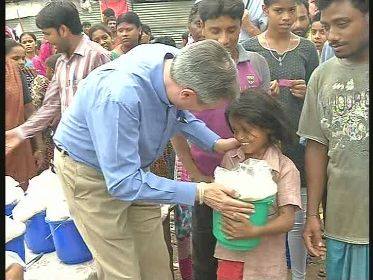
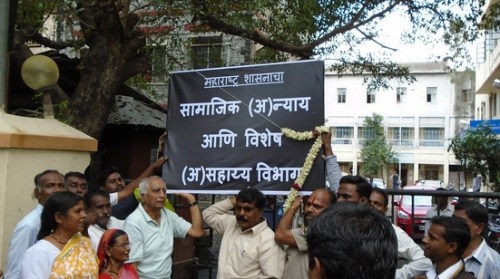
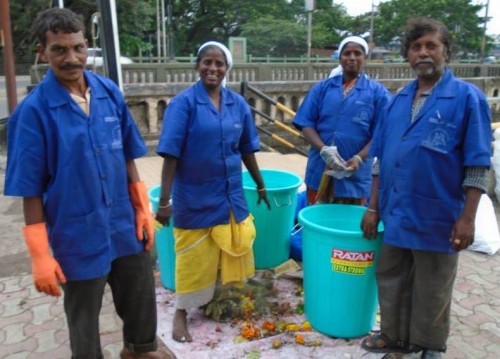


 Latin America
Latin America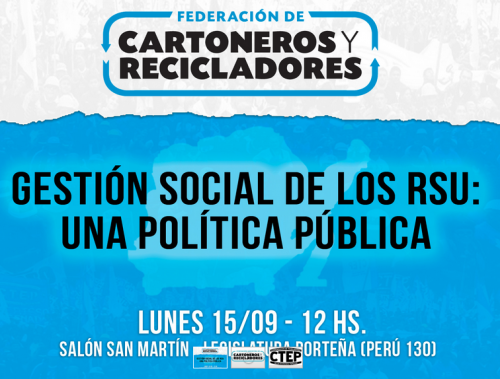
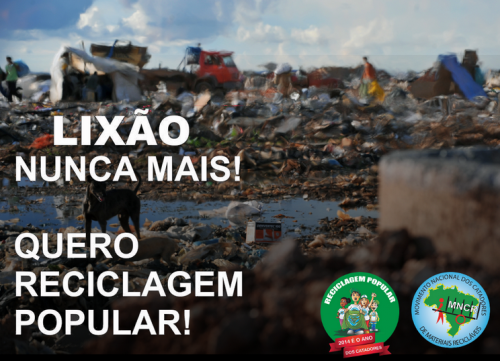
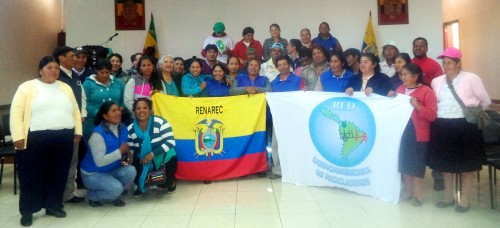
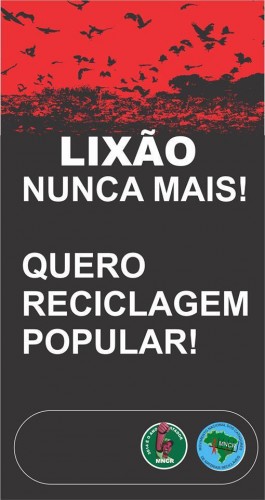

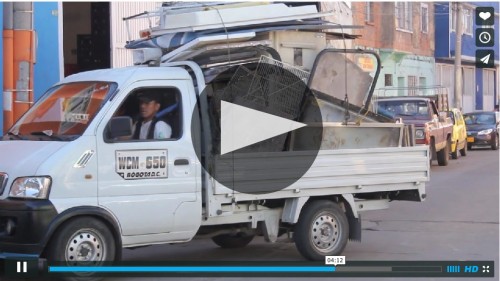
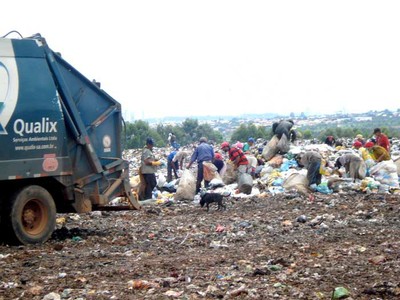

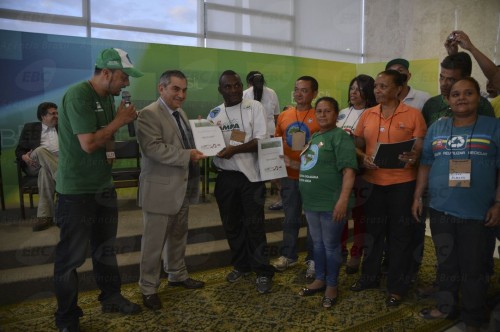
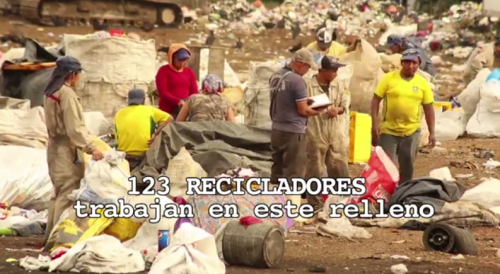
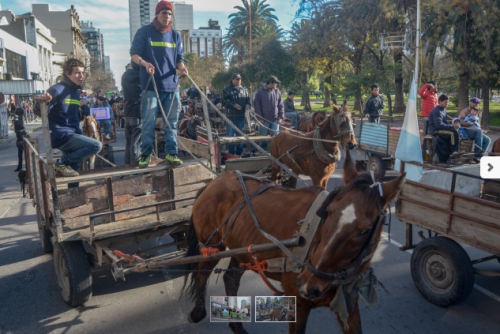
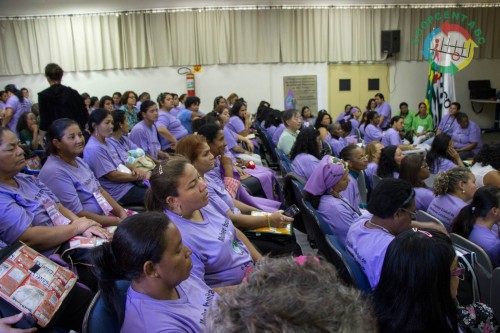
 Europe
Europe

Leave a comment